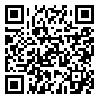BibTeX | RIS | EndNote | Medlars | ProCite | Reference Manager | RefWorks
Send citation to:
URL: http://jdisabilstud.org/article-1-3591-en.html

 , Roja Keyvani2
, Roja Keyvani2 
 , Maryam Nazemi Bejandi3
, Maryam Nazemi Bejandi3 
 , Ezatolah Ghadampour *4
, Ezatolah Ghadampour *4 
 , Mahin Hosseini Chavoshi3
, Mahin Hosseini Chavoshi3 
 , Fateme Bavazin5
, Fateme Bavazin5 

2- MA in Clinical Psychology, Department of Psychology, Islamic Azad University, South Tehran Branch, Tehran, Iran
3- MA in Educational Psychology, Department of Psychology, Rudehen Branch, Islamic Azad University, Tehran, Iran
4- Professor of Educational Psychology, Faculty of Literature and Human Sciences, Lorestan University, Khorramabad, Iran
5- PhD Student in Educational Psychology, Faculty of Literature and Human Sciences, Lorestan University, Khorramabad, Iran
Abstract
Background & Objectives: As a behavior in which an individual intentionally causes his or her own death, suicide is a social problem in the world and a threat to the security of individuals and society. Suicide is committed by different methods, and the choice of suicide method is influenced by the living environment and social context. According to research, it appears that the prevalence of suicide in Iran among adolescents, especially adolescent girls, is relatively high, and among suicide methods, chemical poisoning is also common. In addition, adolescents who attempt suicide also suffer from many social and psychological problems. Poor emotional self–disclosure and low social self–efficacy are among the issues of this group. Due to the importance of emotional self–disclosure and social self–efficacy, many approaches and interventions have been developed to increase the levels of these psychological variables. Two of these interventions are cognitive behavioral therapy and self–determination training. Accordingly, the present study aimed to compare the effectiveness of cognitive behavioral therapy with self–determination training on emotional self–disclosure and social self–efficacy in adolescent girls who attempted chemical suicide.
Methods: This quasi–experimental research employed a pretest–posttest design and a control group. The statistical population consisted of all adolescent girls who attempted chemical suicide and were admitted to the Poisoning Emergency of the Nomadic Martyrs Training and Treatment Center in Khorramabad City, Iran, in 2024. The inclusion criteria were as follows: female gender, attempted chemical suicide, being at least 13 and at most 19 years old, providing consent to participate in the study, not meeting diagnostic criteria for significant psychiatric disorders (such as schizophrenia, personality disorders, etc.), and not taking any psychiatric medication (such as anti–anxiety, anti–psychotic, antidepressant, etc.). The exclusion criteria were as follows: being more than two sessions absent from therapy sessions, not completing homework, not cooperating, and suffering from severe psychiatric illnesses. To comply with ethical principles, explanations were provided to each selected individual regarding the research design, so that there would be no bias in the results. Informed consent was also obtained from the individuals to participate in the study, and the researcher explained issues related to confidentiality and information confidentiality. Using purposive sampling, 46 eligible volunteers were included in the study. These people were randomly assigned to two experimental groups and a control group. The first experimental group received Frey's (1999) cognitive–behavioral therapy, and the second experimental group received Field and Hoffman's (1994) Steps to Self–determination training package. At the beginning of the study, subjects in all three groups completed the Social Self–Efficacy Questionnaire (Smith and Betz, 2000) and the Emotional Self–Disclosure Scale (Snell et al., 1988). After the interventions concluded, they completed both questionnaires again. Data analysis was performed at two levels: descriptive statistics and inferential statistics. At the descriptive level, statistical indicators such as the mean and standard deviation were used. At the inferential level, univariate analysis of covariance and Bonferroni post hoc test were used to examine the research objective. Data were analyzed at a significance level of 0.05 and in SPSS software version 28.
Results: The results showed that both cognitive behavioral therapy and self–determination training had a significant effect on increasing emotional self–disclosure (p<0.001) and social self–efficacy (p<0.001) in adolescent girls who attempted chemical suicide. However, cognitive behavioral therapy had a greater effect on increasing emotional self–disclosure (p = 0.017), and self–determination training was also more effective in increasing social self–efficacy (p = 0.010).
Conclusion: According to the results, cognitive behavioral therapy is more effective and beneficial in increasing emotional self–disclosure in adolescent girls who attempt chemical suicide, and self–determination training is more effective and beneficial in improving the social self–efficacy of these adolescents.
| Rights and permissions | |
 |
This work is licensed under a Creative Commons Attribution-NonCommercial 4.0 International License. |

